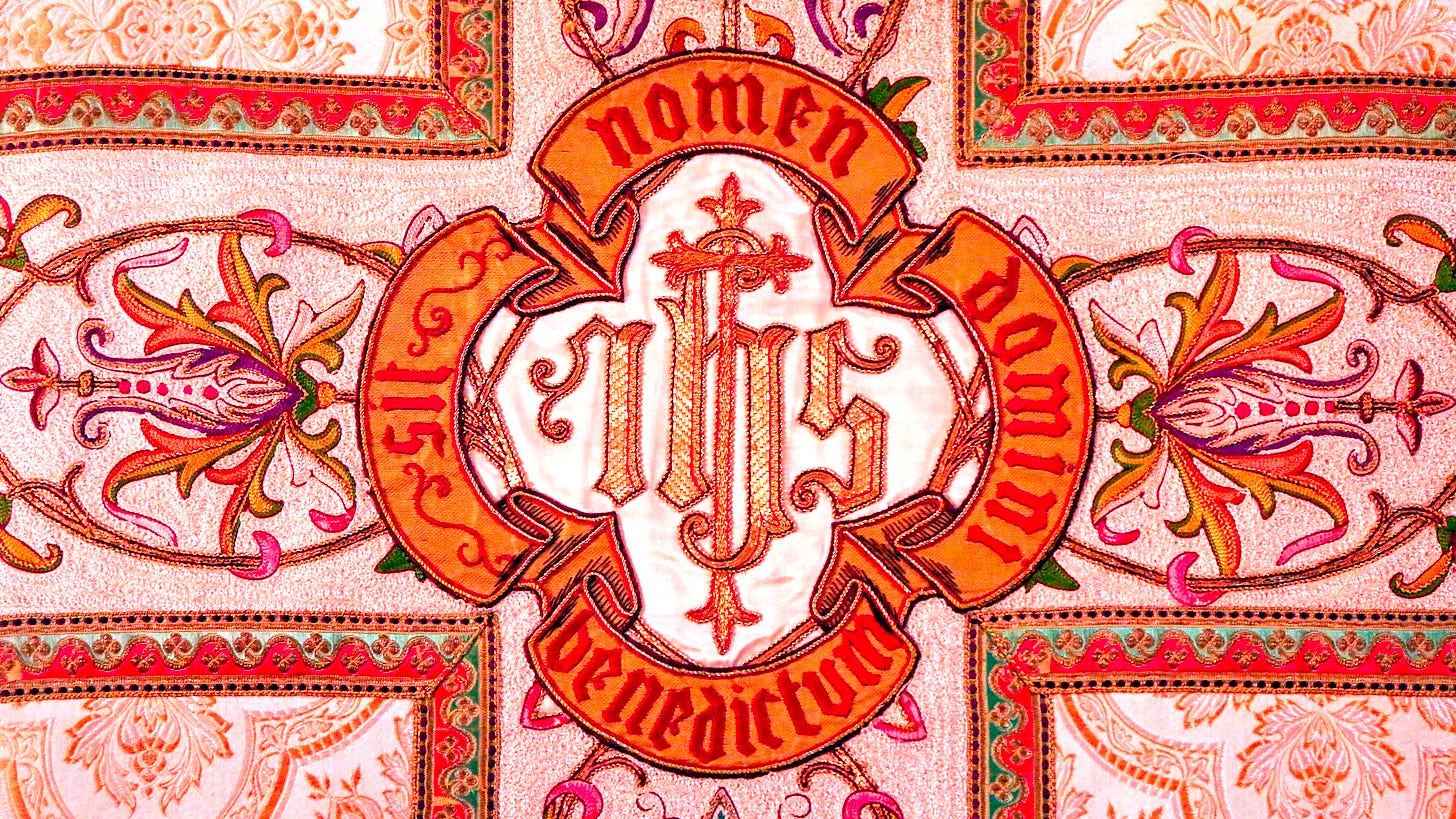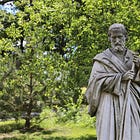Why Christ was given the Holy Name 'Jesus'
The first imposition of the Holy Name of Jesus on the infant God-Man was no less a fulfilment of the Old Covenant than the Circumcision. Fr Coleridge explains why.

The first imposition of the Holy Name of Jesus on the infant God-Man was no less a fulfilment of the Old Covenant than the Circumcision. Fr Coleridge explains why.
In this passage, Fr. Coleridge tells us:
Why the name "Jesus" was expresses the Christ's mission of salvation
How the Holy Name is fulfils all Messianic promises, representing redemption, divine wisdom, and ultimate victory over sin.
How there is power in invoking the Holy Name for the faithful.
He shows us that the Holy Name is a summary of Our Lord Jesus Christ's character and mission, embodying salvation's depth and drawing hearts to love and union with Him.
The Imposition of the Holy Name
The Thirty Years—Our Lord’s Infancy & Hidden Life
Ch. VII, pp 90-98. 1885
Burns and Oates, London (1915 edition).
Headings and some line breaks added.
Giving of the Holy Name
If the shedding of blood in the Circumcision must have signified all these beautiful results of redemption in the souls of the faithful, and thereby filled with a holy and reverential joy the hearts of the blessed pair who were so nearly united to the Heart of our Lord, it is also clear that they must have had a special delight in giving to Him the holy name of Jesus.
That name had been borne before this time by some few others, some of whom had certainly been types and forerunners of Him to Whom it primarily belonged, especially the great captain who had led the Israelites into the Promised Land, and under whose guidance its conquest had been achieved. But it was to belong to our Lord in a manner and a measure of His own; indeed, it could rightly and fully belong only to Him.
The Angel had insisted on it both to our Lady and to St. Joseph, when he revealed to each in turn the part that they were to bear in carrying out the great counsel of God. It was evidently in our Lady’s heart when she uttered her canticle of praise, for to say that her spirit rejoiced in God her Saviour, was the same thing as to mention this Holy Name. In the same way, the Holy Name is alluded to more than once in the Canticle of Zachary. In the Canticle of our Lady it is connected with the exaltation of the human race to the Kingdom of Heaven in the place of the angels. In the Canticle of Zachary, the holy Prophet seems to dwell more particularly on the blessings of a life of holiness and justice and peace in the service of God, which are secured by the mysteries which are signified in the name of Jesus.
But the actual giving of the Name was to be reserved for the time of the Circumcision, and thus for the moment when the Precious Blood was to flow for the first time. It was by that Blood that the price was to be paid of the pardoning and the cancelling of sins, of our adoption or sonship to God, of the opening of the gates of Heaven, and of the admission of man to the eternal possession of God.
Significance of names in God’s Kingdom
As the devotion to the Holy Name of Jesus fills so large a space in the hearts of Christians, we may pause for a moment to endeavour to draw out some of the thoughts which belong to that devotion.
In the first place, it must be remembered that in this, as in other names which occur in the sacred history as having been given by special command or revelation by God, we are assured by this very fact both of the importance of the Name in itself, that it must express fully and perfectly the character and office of Him to Whom it is given, and also that all the graces and blessings involved in the Name will be abundantly supplied by Him Who gives it.
It is only an imperfection in human names that they are designations and nothing more. There is no such thing as an empty title in the Kingdom of God, and the names given by Him imply the spiritual gifts or offices which they signify. Much more, of course, must this be the case with the Name of names, the Holy Name of Jesus. It was chosen specially by God, and communicated to the two persons on earth whose office it was to confer it, that is, to Mary and Joseph, with an express injunction that it was to be given by them to the Divine Child, by Mary as His Mother, and by Joseph as His Father, in all except natural generation.
Anticipations of our Lord’s office
It is, moreover, certain that the Holy Name had been promised and anticipated in the Providence of God. It had been promised in all the predictions which spoke of our Lord as performing the work of salvation, whenever such words as God my Saviour, God shall save us, and the like, had been used by holy prophets of old.
It had been in this way the burden of all the great Messianic prophecies, it had been contained in the whole sacrificial system in which redemption had been prefigured and its fruits applied, in any manner or way whatever, to the souls of men. It had been borne by some of the greatest heroes of the chosen people, whose offices were anticipations of His.
Thus the great captain of Israel represented Him as Ruler and as Conqueror of the enemies of our salvation, the great High Priest, the son of Josedech, represented Him as our Pontiff and Sacrifice, and the great teacher of wisdom, the son of Sirach, represented Him as our Master in the holy lore of salvation. Thus each of these represented, in the work which he was called to do for God, some part or branch of the work of our Lord Himself.
Meaning of the Name in Him
Thus, when the name of Jesus came to be given to our Lord by the command of an Angel, and when the reason for it was given that “He was to save His people from their sins,” it was implied that He Who was to bear it was to sum up in Himself the verification of all the prophecies, the fulfilment of all the types, personal or real, the accomplishment of the whole work of God as designed in His Eternal Wisdom and love for the salvation of the race of man.
Thus, even if we go no further in unfolding the meaning of this blessed Name as given to our Lord, we have already before us, as contained therein, our deliverance from all our spiritual enemies and dangers, the conquest for us of all the goods and riches of the Kingdom of Heaven, the perfect enlightenment which we need as to the knowledge and the service of God, and the most abundant supplies of grace and strength, all bestowed upon us by means of the most perfect atonement and reconciliation to God through the Sacrifice of the Cross.
The fulfilment of the promises and prophecies, as represented in the Holy Name, must be understood as including not only what our Lord was to do for us in His Life and Death, but all that He is to be to us in the Church, all that He is to us in the sacraments, all His personal care and love for our souls, the exercise of His power at the right hand of God in our favour, the intercession which St. Paul and St. John speak of Him as perpetually making, the Light of His example in Himself and in His Mother and His saints, and the power which He exercises on our behalf through them as well as by Himself, the welcome which He is preparing to give us as our Judge, and the eternal rewards with which He longs to crown us in the possession of Himself.
Our Lord revealing the Father
Our Lord came on earth in order to reveal His Father to us, and to win our hearts to our God. He was to do this especially by making Himself known, by the perfect beauty of His virtues, His sweetness and attractiveness and condescension, His humility and charity and meekness, and a thousand other charms in which the excellencies of His Sacred Heart unfolded themselves to our intelligence and made our affections captive.
This was the essence of His teaching, and as the accomplishment of our salvation required that we should learn to serve God by first loving Him, as well as by having our sins atoned for on the Cross, all this part of the work of our Lord is signified in the Holy Name. Thus it stands as a complete summary and description of our Lord’s character, as well as of His office, and it is under this aspect that it has been regarded by thousands of saints, whose hearts have melted at its mere sound, because it has recalled to them all that He has thus revealed to them of Himself, and intensified their love and the spiritual effects of His grace on their souls by that simple act of recollection.
It brings Him back to their minds and hearts as their God, their King, their Redeemer, their Mediator, their Saviour, their great Priest and Intercessor, the Captain under Whom they fight, the Leader Whom they follow, their Teacher, their Lawgiver, the Spouse and the Shepherd of their souls, their Light, their Life, the Judge before Whom they must stand, and their eternal Reward. But He is also to them the mirror of all the most glorious and winning virtues, Charity, Mercy, Kindness, Humility, Piety, Simplicity, Poverty, Chastity.
It is the prerogative of love to transform those who love into the likeness of him whom they love, and as the mere name of one who is loved cannot sound in the ears or be thought of in the mind without adding to the love which is already there, so the thought of the Holy Name and the mention of the Holy Name have a kind of sacramental power in the hearts of His saints. They seem to convey grace to think like Him, to act like Him, to sacrifice themselves to Him, to make Him known to others, and to win them also to love Him.
Power of the Holy Name
But the Holy Name is a name of power as well as of sweetness, as we are constantly reminded in the Sacred Scriptures themselves. His Church pleads it in all her prayers to God, as making her prayers His demands, and clothing their weakness in the might of His infinite satisfaction and resistless impetration.
The faithfulness of God, Who has given us our Lord, and commanded that His Name should sum up all that He is and all that He has done, is pledged to us that the invocation of that Name shall open the gates of mercy to our prayer. The name of Jesus unlocks all the treasures of the Divine Mercy, it stays the arm of His Justice, it turns His anger into pity, and makes His love for our Lord the measure of His compassion for us.
It represents on earth the Kingdom of the Incarnation, the authority and rule of Him to Whom all power is given in Heaven and on earth. The devils flee away at the name of Jesus. In the early days of the Church, and afterwards, amid simple populations lately converted to the faith, children could use it, as they could use the sign of the Cross, and the powers of Hell obeyed them.
The Holy Name has always been the great weapon for the working of miracles of every kind, for our Lord has promised not only that the Father will grant all that we ask in His Name, but also that in His Name those who believe in Him shall cast out devils, and perform all sorts of wonders.
By virtue of this Name thousands of spiritual graces also are constantly bestowed, and it has a singular efficacy in soothing trouble, chasing away fear and despondency, and filling the heart with light and joy and strength, as was the case with our Lord’s own bodily presence, as when He went up into the boat in which His disciples had been toiling against the winds and waves, and the sea fell, and the storm ceased, and they were at once at the shore.
Its invocation by the faithful
The truth that the invocation of this Name by the children of the Church has a legitimate power over the enemies of our salvation, is proved by the anecdote in the Acts, when it was used by those who had no right to use it, and the devil turned on them saying, “Jesus I know and Paul I know, but who are you?”1
This explains a great deal of the language of the Saints concerning the Holy Name. It is not only a Name of power and efficacy, pleading before God the infinite merits of Him Who bore it, and representing to the face of God and man Him Who has overcome Hell. It is also a token and seal of the union that makes those who believe in Him in His Church one with Him, members of His Body, of His Flesh and of His Bones, as St. Paul says. It is this union which gives to Christians a right to use it, as the children of a King have a right to use his name, and as his magistrates and officers and representatives clothe themselves by its use with his authority.
It is not a charm, as if it might be used for any purpose, by persons in any moral state, or of any form of belief. But when used with faith and devotion by who belong to our Lord, it may have any effect connected with the work of salvation which it signifies. This is what St. Peter says of it on the first occasion when it was used as a name of power, when he healed the lame man at the Beautiful Gate. “His Name, through faith in His Name, hath made this man strong whom you have seen and know.”2
The power is in the Name, when it is used in faith. There is no limit to the occasions when it may be used with efficacy, because our Lord, in His Human Life, has touched all the circumstances of our daily existence, He has lived like one of us, to make Himself our brother, and in consequence of this there is no part of our life in which we cannot unite ourselves with Him. Thus we may take, in this sense, literally what St. Paul says to the Colossians, “All whatsoever you do in word or work, do all in the Name of the Lord Jesus Christ.”3
For a devout and thoughtful interior act of union with Him in anything cannot be without its fruit in reviving all the grace which we have derived from Him, and thus the invocation of His Name at such a time has an efficacy, partly from our own devotion and faithfulness, but also from the Holy Name itself, in the sense in which St. Peter speaks. It is like the sign of the Cross, or the use of the Crucifix.
From Fr Henry James Coleridge, The Thirty Years, Our Lord’s Infancy & Hidden Life, ‘The Circumcision’, published 1885, this edition Burns and Oates, London, 1915, pp 90-98
Here’s why you should subscribe to The Father Coleridge Reader and share with others:
Coleridge provides solid explanations of the entirety of the Gospel
His work is full of doctrine and piety, and is highly credible
He gives a clear trajectory of the life of Christ and all its stages.
If more Catholics knew about works like Fr Coleridge’s, then other works based on sentimentality or dubious private revelations would be less attractive.
Sourcing and curating the texts, cleaning up scans, and editing them for online reading is a labour of love, and takes a lot of time.
Will you lend us a hand and hit subscribe?
Read next:
Follow our projects on Twitter, YouTube and Telegram:
Acts xix. 15.
Acts iii. 16.
Coloss. iii. 17.






